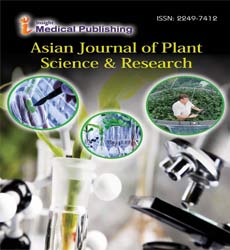ISSN : 2249 - 7412
Asian Journal of Plant Science & Research
Potential Biofuel Plant as a Result of Advances in Biotechnology
Sam Lewis*
Department of Plant Science, University of Wollongong, Wollongong, Australia
- *Corresponding Author:
- Sam Lewis
Department of Plant Science,
University of Wollongong, Wollongong,
Australia,
E-mail: Lewis_S@Led.au
Received date: February 01, 2023, Manuscript No. AJPSKY-23-16875; Editor assigned date: February 03, 2023, PreQC No. AJPSKY-23-16875 (PQ); Reviewed date: February 17, 2023, QC No. AJPSKY-23-16875; Revised date: February 24, 2023, Manuscript No. AJPSKY-23-16875 (R); Published date: February 28, 2023, DOI: 10.36648/2249-7412.13.2.055
Citation: Lewis S (2023) Potential Biofuel Plant as a Result of Advances in Biotechnology. Asian J Plant Sci Res Vol.13 No.2: 055
Description
Biotechnology refers to the use of living organisms or their components to develop or modify products and processes for various applications. In the context of plants, biotechnology involves the application of scientific techniques to enhance plant traits, improve agricultural practices, and develop sustainable solutions for food security and environmental challenges.
One of the key areas of plant biotechnology is genetic engineering, which involves the manipulation of an organism’s genetic material to introduce new traits or modify existing ones. Genetic engineering in plants typically involves the insertion of specific genes, often from unrelated species, into the plant’s genome to confer desired characteristics. This technique has enabled the development of Genetically Modified (GM) crops with enhanced traits such as increased yield, improved nutritional content and resistance to pests, diseases, and environmental stresses. GM crops have significantly impacted agriculture by improving crop productivity and reducing losses due to pests and diseases. For example, insect-resistant crops, such as Bt cotton and Bt corn, have been engineered to produce a natural insecticidal protein derived from the soil bacterium Bacillus thuringiensis. These crops have reduced the need for chemical insecticides, resulting in lower costs and decreased environmental impact.
Genetically Modified
Biotechnology has also played a crucial role in developing crops with enhanced nutritional content. Golden Rice, for instance, is a genetically engineered rice variety that contains increased levels of vitamin A precursors. This development aims to address vitamin A deficiency, a widespread health issue in many developing countries. Another significant application of biotechnology in plant science is tissue culture, or in vitro propagation, which involves growing plant cells, tissues, or organs under sterile conditions in a laboratory. This technique allows for the rapid propagation of plants from a small tissue sample, bypassing the need for traditional seed-based reproduction. Tissue culture is used to produce disease-free plantlets, mass propagate valuable plant varieties, and regenerate plants from rare or endangered species. Plant biotechnology has also contributed to the development of molecular markers and DNA sequencing technologies, enabling researchers to better understand plant genomes and genetic diversity. This knowledge facilitates the identification of genes associated with desirable traits, helping breeders develop new plant varieties through conventional breeding techniques. Furthermore, biotechnology plays a significant role in plant biopharming, which involves the production of valuable pharmaceutical compounds, vaccines, and industrial enzymes in plants. Plant-based production systems offer advantages such as cost-effectiveness, scalability, and reduced risk of contamination compared to traditional methods. This technology has the potential to revolutionize the production of therapeutics and contribute to global health initiatives.
Biotechnology has also emerged as a tool to address environmental challenges. For example, phytoremediation utilizes plants to clean up contaminated soil and water by absorbing, degrading, or immobilizing pollutants. This approach has been used to remediate sites contaminated with heavy metals, organic compounds, and other pollutants. In addition to these applications, plant biotechnology is also advancing the development of stress-tolerant crops, such as drought-tolerant and salt-tolerant varieties, to cope with changing climatic conditions. These crops have the potential to improve agricultural resilience, particularly in regions vulnerable to water scarcity and soil salinity.
Ecosystem Stability
Despite the numerous benefits, plant biotechnology also raises ethical, social, and environmental concerns. Issues related to intellectual property rights, biosafety, labeling of GM products, and the potential impact on biodiversity and ecosystem stability are subjects of ongoing debates and regulation. In conclusion, plant biotechnology has revolutionized agriculture and offers immense potential for addressing global challenges related to food security, nutrition, and environmental sustainability. Genetic engineering, tissue culture, molecular markers, and other biotechnological tools are being harnessed to develop crops with improved traits, enhance plant propagation, understand genetic diversity, produce valuable pharmaceuticals, and tackle environmental issues. However, careful considerations and regulations are necessary to ensure the safe and responsible deployment of biotechnology in plant science. Biofuels are renewable energy sources derived from organic matter, such as plants, crops, and waste materials that can be used as an alternative to fossil fuels. They offer several advantages, including reduced greenhouse gas emissions and the potential for energy independence. Among the various types of biofuels, there are several promising options with the potential for widespread adoption and significant impact.
One potential biofuel is ethanol, which is primarily produced from crops such as corn, sugarcane, and wheat. Ethanol is commonly blended with gasoline to create bioethanol, which can be used as a transportation fuel. Ethanol production involves fermenting the sugars found in plant biomass and converting them into alcohol. Bioethanol is already widely used as a fuel additive and can be used in higher concentrations in flex-fuel vehicles. Biodiesel is another important biofuel derived from vegetable oils, animal fats, or recycled cooking oil. It is produced through a process called trans esterification, which converts the fats or oils into biodiesel and glycerin. Biodiesel can be blended with petroleum diesel or used as a pure fuel in diesel engines. It has similar properties to petroleum diesel and can be used in existing diesel vehicles without modifications.
A potential biofuel with significant promise is algae-based biofuel. Algae are highly efficient in converting sunlight and carbon dioxide into biomass through photosynthesis. They can produce high amounts of oil that can be extracted and converted into biodiesel. Algae cultivation can be done in various settings, including open ponds, closed photobioreactors, and even wastewater treatment facilities, making it a versatile and scalable option. Biogas, also known as renewable natural gas, is a biofuel produced through the anaerobic digestion of organic matter, such as agricultural waste, food waste, and sewage. The anaerobic digestion process breaks down the organic matter, producing biogas—a mixture of methane and carbon dioxide. Biogas can be purified and used as a fuel for electricity generation, heating, or even as a transportation fuel in Compressed Natural Gas (CNG) vehicles.

Open Access Journals
- Aquaculture & Veterinary Science
- Chemistry & Chemical Sciences
- Clinical Sciences
- Engineering
- General Science
- Genetics & Molecular Biology
- Health Care & Nursing
- Immunology & Microbiology
- Materials Science
- Mathematics & Physics
- Medical Sciences
- Neurology & Psychiatry
- Oncology & Cancer Science
- Pharmaceutical Sciences
